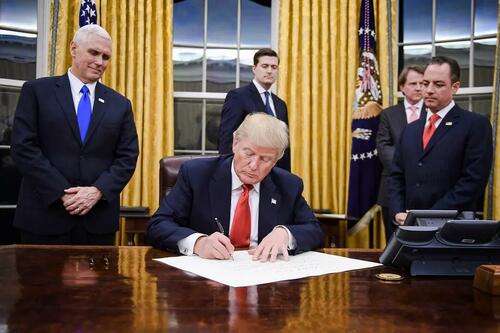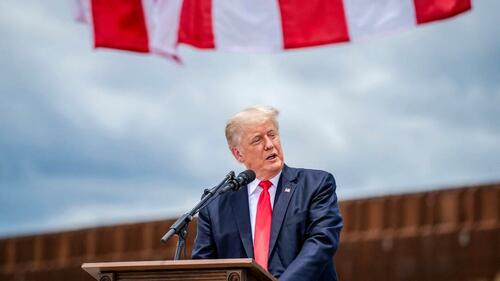Authored by Janice Hisle via The Epoch Times (emphasis ours),
Based on his campaign trail statements, President-elect Donald Trump is poised to sign a flurry of executive orders as soon as he regains power on Jan. 20, 2025.
He will become only the second former U.S. president to return to office after losing a reelection bid. President Grover Cleveland, a Democrat, served as the 22nd and 24th president in the late 1800s.
Trump, a Republican who served as the 45th president, will become the 47th president after defeating Vice President Kamala Harris in the Nov. 5 election. She became a replacement candidate for the Democratic Party after President Joe Biden, the 46th president, dropped out of the race on July 21.
Throughout Trump’s 2024 presidential campaign, which he began in late 2022, Trump has stated that he plans to begin tackling numerous issues on “day one,” ranging from border security to the economy.
He has repeatedly made pledges that would make for a busy first day in office in 2025.
In late 2023, Trump joked with a Fort Dodge, Iowa, audience about his eagerness to begin signing documents on Inauguration Day.
“I may even have a very tiny little desk put on the 20th stair” of the U.S. Capitol, where he could begin signing documents immediately after taking the Oath of Office, Trump said.
It’s anyone’s guess how many executive orders Trump might sign during his new administration’s first day—which is a short one. His second presidential term begins when the day is half over.
Under the 20th Amendment to the U.S. Constitution, executive power transfers to the newly elected president every four years at noon on Jan. 20.
New presidents are also likely to sign other documents, such as Trump’s proclamation designating his first day in office, Jan. 20, 2017, as a “National Day of Patriotic Devotion.” The proclamation’s intent was “to strengthen our bonds to each other and to our country—and to renew the duties of Government to the people.”
But executive orders are among the most important documents a new president can sign.
These orders, which have been used by almost every U.S. president, carry about the same weight as federal law. And they remain in effect unless Congress overrules them, a court overturns them, or a future president revokes them. These orders also signal what the new president’s priorities will be.
When Biden took office in 2021, he signed nine executive orders on his first day. One of them reversed an immigration and border security executive order that Trump signed on Jan. 25, 2017, the fifth day of his first term in office.
In contrast, Trump penned just one executive order on Inauguration Day 2017; that order focused on reducing the financial burdens of the Affordable Care Act, known as Obamacare.
Here are a few of the many executive orders and initiatives that Trump has pledged for his upcoming term.

Top Priority: Border Security and Immigration
In the spring of 2024, Trump said border security and immigration would be foremost on his second term agenda.
“Day one, my act one will be to close that border,” he said at the time.
Since then, Trump has made immigration-related pledges numerous times.
An order closing the border would be “done in the first hour of the first day” under his new administration, Trump said during an October campaign stop.
“On day one, I will launch the largest deportation program ... in the history of our country,” he said at one of his final campaign events in Pittsburgh on Nov. 4, a day before the election. “I will rescue every city and town that has been invaded ... and we will put the vicious and bloodthirsty criminals in jail.”
Trump’s 2017 executive order on border security, signed on Jan. 25, 2017, directed the Department of Homeland Security to close the border and to take several other immediate steps, including building more sections of the U.S.–Mexico border wall and adding 5,000 Border Patrol agents.
That initial order also called for revamping the way that the government handled illegal immigrants’ asylum claims, detentions, and deportations.
Economy and Energy
When it comes to the economy, Trump says reducing the cost of energy is key to lowering the prices that people pay for essentials such as gasoline and groceries.
He has pledged to implement policies that encourage the production of fossil fuels. “We will frack, frack, frack, and drill, baby, drill,” Trump said during an Oct. 29 speech in Allentown, Pennsylvania. He said he would encourage those processes beginning on “day one,” but it was unclear whether an executive order would be used for that purpose.
However, Trump did say he would sign an executive order “directing every federal agency to immediately remove every single burdensome regulation driving up the cost of goods.” He made that pledge on Oct. 31 in Albuquerque, New Mexico, promising “emergency price relief” for all Americans.
Trump also said he would create a new cabinet position focused on “doing everything in the federal government’s power to reduce the cost of living.”

Taxes, Credit Card Rates
Trump told a crowd in Mint Hill, North Carolina: “Starting on day one, we will end inflation and make America affordable again.”
He continued in that Sept. 25 speech: “We will have no tax on tips, no tax on overtime, and no tax on Social Security. ... And while working Americans catch up, we are going to put a temporary cap on credit card interest rates at 10 percent.”
A few members of Congress have been working on no-tax-on-tips proposals for some time; Trump likely would need to work with Congress on these initiatives.
Funds Halted for ‘Inappropriate’ Curricula
More than a year ago at the Pray Vote Stand Summit in Washington, on Sept. 15, 2023, Trump said, “On day one, I will sign a new executive order to cut federal funding for any school pushing Critical Race Theory, transgender insanity, and other inappropriate racial, sexual, or political content on our children.”
He has reiterated that stance many times since.
Order to End ‘Mutilation’ of Youths
In a policy video posted to social media on Jan. 31, 2023, Trump outlined a wide-ranging plan to halt “chemical, physical, and emotional mutilation of our youth.”
“On day one, I will revoke Joe Biden’s cruel policies on so-called ‘gender-affirming care’—ridiculous—a process that includes giving kids puberty blockers, mutating their physical appearance, and ultimately performing surgery on minor children,” Trump said.
“I will sign a new executive order instructing every federal agency to cease all programs that promote the concept of sex and gender transition at any age.”
Trump also said he would ask Congress “to permanently stop federal taxpayer dollars from being used to promote or pay for these procedures and pass a law prohibiting child sexual mutilation in all 50 states.”
The U.S. Supreme Court is now considering the constitutionality of Tennessee’s ban on such procedures for minors; many other states also passed similar laws that have faced court challenges.
Read the rest here...
Authored by Janice Hisle via The Epoch Times (emphasis ours),
Based on his campaign trail statements, President-elect Donald Trump is poised to sign a flurry of executive orders as soon as he regains power on Jan. 20, 2025.
He will become only the second former U.S. president to return to office after losing a reelection bid. President Grover Cleveland, a Democrat, served as the 22nd and 24th president in the late 1800s.
Trump, a Republican who served as the 45th president, will become the 47th president after defeating Vice President Kamala Harris in the Nov. 5 election. She became a replacement candidate for the Democratic Party after President Joe Biden, the 46th president, dropped out of the race on July 21.
Throughout Trump’s 2024 presidential campaign, which he began in late 2022, Trump has stated that he plans to begin tackling numerous issues on “day one,” ranging from border security to the economy.
He has repeatedly made pledges that would make for a busy first day in office in 2025.
In late 2023, Trump joked with a Fort Dodge, Iowa, audience about his eagerness to begin signing documents on Inauguration Day.
“I may even have a very tiny little desk put on the 20th stair” of the U.S. Capitol, where he could begin signing documents immediately after taking the Oath of Office, Trump said.
It’s anyone’s guess how many executive orders Trump might sign during his new administration’s first day—which is a short one. His second presidential term begins when the day is half over.
Under the 20th Amendment to the U.S. Constitution, executive power transfers to the newly elected president every four years at noon on Jan. 20.
New presidents are also likely to sign other documents, such as Trump’s proclamation designating his first day in office, Jan. 20, 2017, as a “National Day of Patriotic Devotion.” The proclamation’s intent was “to strengthen our bonds to each other and to our country—and to renew the duties of Government to the people.”
But executive orders are among the most important documents a new president can sign.
These orders, which have been used by almost every U.S. president, carry about the same weight as federal law. And they remain in effect unless Congress overrules them, a court overturns them, or a future president revokes them. These orders also signal what the new president’s priorities will be.
When Biden took office in 2021, he signed nine executive orders on his first day. One of them reversed an immigration and border security executive order that Trump signed on Jan. 25, 2017, the fifth day of his first term in office.
In contrast, Trump penned just one executive order on Inauguration Day 2017; that order focused on reducing the financial burdens of the Affordable Care Act, known as Obamacare.
Here are a few of the many executive orders and initiatives that Trump has pledged for his upcoming term.

Top Priority: Border Security and Immigration
In the spring of 2024, Trump said border security and immigration would be foremost on his second term agenda.
“Day one, my act one will be to close that border,” he said at the time.
Since then, Trump has made immigration-related pledges numerous times.
An order closing the border would be “done in the first hour of the first day” under his new administration, Trump said during an October campaign stop.
“On day one, I will launch the largest deportation program ... in the history of our country,” he said at one of his final campaign events in Pittsburgh on Nov. 4, a day before the election. “I will rescue every city and town that has been invaded ... and we will put the vicious and bloodthirsty criminals in jail.”
Trump’s 2017 executive order on border security, signed on Jan. 25, 2017, directed the Department of Homeland Security to close the border and to take several other immediate steps, including building more sections of the U.S.–Mexico border wall and adding 5,000 Border Patrol agents.
That initial order also called for revamping the way that the government handled illegal immigrants’ asylum claims, detentions, and deportations.
Economy and Energy
When it comes to the economy, Trump says reducing the cost of energy is key to lowering the prices that people pay for essentials such as gasoline and groceries.
He has pledged to implement policies that encourage the production of fossil fuels. “We will frack, frack, frack, and drill, baby, drill,” Trump said during an Oct. 29 speech in Allentown, Pennsylvania. He said he would encourage those processes beginning on “day one,” but it was unclear whether an executive order would be used for that purpose.
However, Trump did say he would sign an executive order “directing every federal agency to immediately remove every single burdensome regulation driving up the cost of goods.” He made that pledge on Oct. 31 in Albuquerque, New Mexico, promising “emergency price relief” for all Americans.
Trump also said he would create a new cabinet position focused on “doing everything in the federal government’s power to reduce the cost of living.”

Taxes, Credit Card Rates
Trump told a crowd in Mint Hill, North Carolina: “Starting on day one, we will end inflation and make America affordable again.”
He continued in that Sept. 25 speech: “We will have no tax on tips, no tax on overtime, and no tax on Social Security. ... And while working Americans catch up, we are going to put a temporary cap on credit card interest rates at 10 percent.”
A few members of Congress have been working on no-tax-on-tips proposals for some time; Trump likely would need to work with Congress on these initiatives.
Funds Halted for ‘Inappropriate’ Curricula
More than a year ago at the Pray Vote Stand Summit in Washington, on Sept. 15, 2023, Trump said, “On day one, I will sign a new executive order to cut federal funding for any school pushing Critical Race Theory, transgender insanity, and other inappropriate racial, sexual, or political content on our children.”
He has reiterated that stance many times since.
Order to End ‘Mutilation’ of Youths
In a policy video posted to social media on Jan. 31, 2023, Trump outlined a wide-ranging plan to halt “chemical, physical, and emotional mutilation of our youth.”
“On day one, I will revoke Joe Biden’s cruel policies on so-called ‘gender-affirming care’—ridiculous—a process that includes giving kids puberty blockers, mutating their physical appearance, and ultimately performing surgery on minor children,” Trump said.
“I will sign a new executive order instructing every federal agency to cease all programs that promote the concept of sex and gender transition at any age.”
Trump also said he would ask Congress “to permanently stop federal taxpayer dollars from being used to promote or pay for these procedures and pass a law prohibiting child sexual mutilation in all 50 states.”
The U.S. Supreme Court is now considering the constitutionality of Tennessee’s ban on such procedures for minors; many other states also passed similar laws that have faced court challenges.
Read the rest here...

